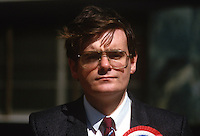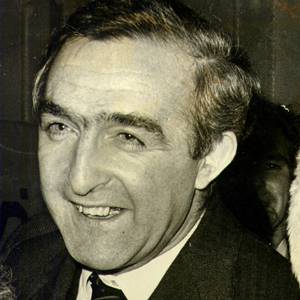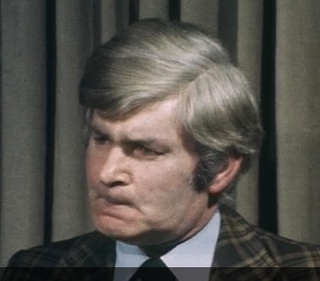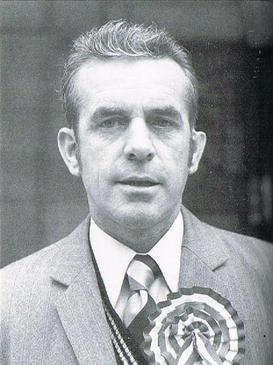Related Research Articles

Ian Richard Kyle Paisley, Baron Bannside, was a loyalist politician and Protestant religious leader from Northern Ireland who served as leader of the Democratic Unionist Party (DUP) from 1971 to 2008 and First Minister of Northern Ireland from 2007 to 2008.

Peter David Robinson is a retired Northern Irish politician who served as First Minister of Northern Ireland from 2008 until 2016 and Leader of the Democratic Unionist Party (DUP) from 2008 until 2015. Until his retirement in 2016, Robinson was involved in Northern Irish politics for over 40 years, being a founding member of the DUP along with Ian Paisley.

The Shankill Road is one of the main roads leading through West Belfast, in Northern Ireland. It runs through the working-class, predominantly loyalist, area known as the Shankill.

George Seawright was a Scottish-born unionist politician in Northern Ireland and loyalist paramilitary in the Ulster Volunteer Force. He was assassinated by the Irish People's Liberation Organisation in 1987.

Augustus Andrew Spence was a leader of the paramilitary Ulster Volunteer Force (UVF) and a leading loyalist politician in Northern Ireland. One of the first UVF members to be convicted of murder, Spence was a senior figure in the organisation for over a decade.

Desmond Norman Orr Boal was a unionist politician and barrister from Northern Ireland.

Ulster Resistance (UR), or the Ulster Resistance Movement (URM), is an Ulster loyalist paramilitary movement established by the Democratic Unionist Party (DUP) in Northern Ireland in November 1986 in opposition to the Anglo-Irish Agreement.

Hugh Smyth OBE was a Northern Irish Ulster Loyalist and politician who was leader of the Progressive Unionist Party (PUP) from 1979 to 2002, as well as during an interim period in 2011. He was Lord Mayor of Belfast from 1994 to 1995, as well as a Belfast City Councillor for the Court DEA from 1972 to 2014, making him one of the longest-serving members on the Council. Smyth was awarded the Order of the British Empire in the 1996 New Year's Honours list.
The Shankill Defence Association was a loyalist vigilante group formed in May 1969 for the defence of the loyalist Shankill Road area of Belfast, Northern Ireland during the communal disturbances that year.

John Dunlop McKeague was a Northern Irish loyalist and one of the founding members of the paramilitary group the Red Hand Commando in 1970. A number of authors on the Troubles in Northern Ireland have accused McKeague, a homosexual paederast, of involvement in the Kincora Boys' Home scandal but he was never convicted. He was shot dead by the Irish National Liberation Army (INLA) in Belfast in January 1982.
Clifford Smyth is a Northern Irish historian and former unionist politician.
William Brian Maginess, QC, was a member of the Government of Northern Ireland, who was widely seen as a possible successor to The 1st Viscount Brookeborough as Prime Minister of Northern Ireland.
The Protestant Telegraph was a Northern Irish newspaper founded by Noel Doherty and Ian Paisley on 13 February 1966. It was noted for its Protestant fundamentalism and its attacks on the Roman Catholic Church, the Church of Ireland and the moderates within the Ulster Unionist Party, as typified by Terence O'Neill.

William Mitchell was a Northern Ireland loyalist, community activist and member of the Progressive Unionist Party. Mitchell was a leading member of the loyalist Ulster Volunteer Force (UVF) and served a life sentence for his part in a double murder. He later abandoned his UVF membership and took up cross-community work.

Kenneth Gibson was a Northern Irish politician who was the Chairman of the Volunteer Political Party (VPP), which he had helped to form in 1974. He also served as a spokesman and Chief of Staff of the loyalist paramilitary organisation, the Ulster Volunteer Force (UVF).

The Woodvale Defence Association (WDA) was an Ulster loyalist vigilante group in the Woodvale district of Belfast, an area immediately to the north of the Shankill Road.
William Elliot was a former Northern Irish loyalist who served as brigadier of the Ulster Defence Association's (UDA) East Belfast Brigade in the 1980s.
Billy Spence was a loyalist activist in Northern Ireland. A native of the Shankill Road area of Belfast, Spence was a leading figure with both Ulster Protestant Action and the Ulster Volunteer Force.
Charles McCullough, sometimes known as Charlie McCullough, was a Northern Irish unionist politician, native of Belfast.
Noel Docherty was a Northern Irish loyalist activist who was close to Ian Paisley during Paisley's early years in politics. He served as leader of the Ulster Protestant Volunteers and was imprisoned for his involvement in procuring explosives for that organisation.
References
- ↑ Clifford Smyth, Ian Paisley: Voice of Protestant Ulster, p.6
- ↑ See CEB Brett, Long Shadows Cast Before, Edinburgh, 1978, pp.130–131.
- ↑ Ed Moloney and Andrew Pollak, Paisley, p.82
- 1 2 See Wood, Ian S., 'The IRA's Border Campaign' p.123 in Anderson, Malcolm and Eberhard Bort, ed. 'Irish Border: History, Politics, Culture'. Liverpool University Press. 1999
- 1 2 3 Clifford Smyth, Ian Paisley: Voice of Protestant Ulster, p.9
- ↑ "Maginess, (William) Brian", Oxford Dictionary of National Biography
- ↑ Ed Moloney and Andrew Pollak, Paisley, p.100